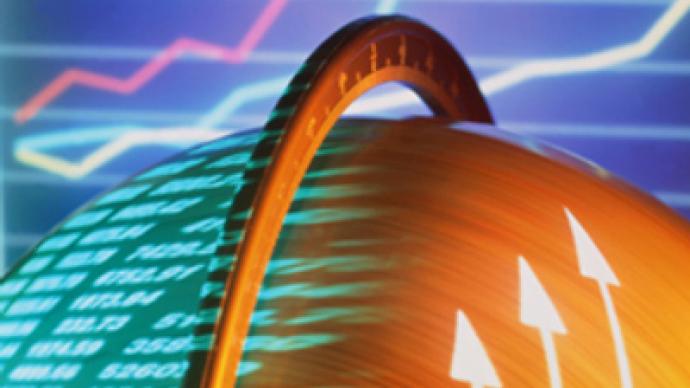The global markets and Russia

With major economies continuing to grind their way out of recession Business RT spoke with Peter Ghavami, head of global markets at Troika Dialog, about the factors at play and how Russia is affected.
RT: Recent data has given rise to renewed fears about the possibility of either a double dip recession, or a protracted period slow growth for major global economies – what do you believe is more likely?
PG: "Clearly, some of the economic data that comes out of the US and some of the things that are happening in Ireland, some of the difficulties that we've seen in the European periphery have caused people to speculate about the possibility of a double dip recession. I don't' believe that we, in the developed world as a whole, are going to see a double dip recession.
For example, with respect to the US, I don't believe that the US is going into recession again, but there are certain countries that very possibly can go into recession. So, I think, we need to stratify and look at individual countries. It's not going to be Europe as a whole, it's not going to be the US or Canada. But for example it's quite possible that Ireland could go into recession again.
If you look at the Irish Government right now, it's facing some significant challenges with respect to the banking system in Ireland. It's very similar to what happened to the banking system in Iceland. If you look at banking as a percentage of GDP, for Ireland it's one of the highest in the World. And the banking crisis together with devaluation in the housing stock has caused the Irish Government, first, to extend guarantees on all Irish banks and second, to pump a lot of money into the Irish banking system. They may need to pump as much as 35 billion euro into Anglo-Irish Bank, for example. For a country of the size of Ireland that's a massive amount of money."
RT: What do you believe the implications are for Russia of this scenario?
PG: "If I look back and then look ahead, the first thing I would remark is that the macroeconomic response by the Central Bank, by the Ministry of Finance in Russia was on target and much quicker than it was in the west. So, the policy response was very appropriate for the difficulties that Russia faced and significantly aided in making sure that Russia came out of the crisis in an OK state. The reasons why the Government was able to do that was because it had saved enough for a rainy day, precisely for this event. Also, because, I believe, Russian policy makers successfully learned from some of the crises of the past in order to deal with this new crisis, whereas Western policy makers weren't nearly as quick to react to what was happening. So, I think, that speaks very highly of officials involved into finance ministry and the top levels at the CB. Looking forward, I believe that what Russia needs to be concerned with is making sure it continues to keep inflation in check – that's probably the single most important risk factor for Russia from a macro perspective.
One of the big benefits of the crisis has been that Government spending was reduced or kept flat, since it was the Government spending that was actually feeding the inflation rate. Having reduced inflation from the double digits that it was for most of the decade to single digits, to around 6%, has been a huge achievement.
Now when you look, you see that the inflation during the summer time has been creeping up again, not just because of the drought, not just because of the agriculture impact, but also because of the increased government spending, probably leading up to the next election cycle. That's the point that Russian policy makers need to really watch carefully.
We expect growth of 4-5% this year and probably the same next year in Russia. Anyway, there's one scenario that maybe can cause a double dip in Russia, though it is a highly unlikely one: if economies around the world all started going into recession then commodity prices would collapse. But I don't see that. China is continuing to grow, I see good growth coming out of India, Africa, while not such an important factor in terms of GDP share, is growing, Brazil is growing, the United States in spite of all bad economic news is still growing, it's not growing at 3% – it's growing at 1.5% to 2%, but there is still growth. Where you see issues, they are in the periphery countries: Greece, Spain, Portugal, Ireland. The other issues are persistent high levels of unemployment, which can lead to a social unrest, etc. But none of that is really going to impact Russia."
RT: The Brazilian finance minister has this week warned about currency wars' in terms of major trading nations trying to hold their currencies lower to maintain competitiveness. At the same time we see major commodity currencies at long term highs. Why do you think this is happening?
PG: "It's a fact that if you look at the way governments around the world have dealt with the crisis, it is through stimulating export demand by devaluing their currencies. The British pound went down from approximately $2 to as low as, I believe, $1.38 and is now back to approximately $1.58 – so, that was a significant devaluation versus the US Dollar. When, if you look at the US Dollar versus Euro, you'll see that the US Government effectively did the same thing. The US Dollar at first strengthened because of technical reasons, but then devalued. And now the US is trying to get the Dollar to be devalued versus the Chinese currency and this is creating a big conflict between China and the United States, because, I believe, while China understands that its currency is currently undervalued, it wants to have it appreciated step by step in a controlled fashion."
And commodity currencies are going up because people have no other currencies to buy as a safe heaven. "Commodity currencies" prove to be the one few choices left for those who are selling dollars or euros. Also, commodity prices as a whole have gone up significantly from their lows in the middle of the crisis and that's going to naturally support the economies and the currencies of those currencies."
RT: Do you think Russian Rouble is it properly valued at the moment?
PG: "If you look at the dynamics of oil and the Rouble, you'll see an incredibly tight correlation. If you look at where oil is traded now and you look at Rouble, and you look historically what that meant, you'll see that Rouble is undervalued by 1 or 2 Roubles. On the other hand, because of inflationary concerns, some may say that the Rouble is overvalued. So, in my view, the Ruble now is roughly where it should be. The Central Bank has done a good job over the last year and a year and a half in letting the Ruble float. It's not a perfect float, it's not a complete float, it's what we call a “dirty float,” which means the Central Bank will intervene from time to time but much less than it did in the past."RT: Authorities in Russia talk a lot about turning Moscow into a major financial centre. How likely is that?
PG:"I think that Moscow is slowly becoming a financial centre. People usually have a lot of skepticism whether it can or can't. But my view is very simple: the world is moving away from New York and London towards regional centers in the emerging markets. In this respect, emerging markets are now much more important than ever before, which means that India, China are now much more important. And there's a lot of trade between China, Russia, Africa, Brazil that no longer flows through New York or London, which by definition means that Moscow as a hub for some of that trading becomes more relevant and more important. It's just going to take some time."
RT: There has been some comment in the press that the Russian government and related organizations are crowding out the private sector in bond markets. What do you think the implications of this are likely to be?
PG: "There have been some speculations that increased government borrowing to fund the budget deficit Russia now has, and previously didn't have, is leading to a crowding out effect that would make interest rates for corporate borrowing go up. I believe that this theory is still to be tested, I'm not convinced of that. I don't think that we have fully tested the depth of the liquidity that exists in the Russian Rouble markets and, I think, this is something that we'll find out within 6 or 12 months, when Russian government and corporate borrowing match each other and overlap."













